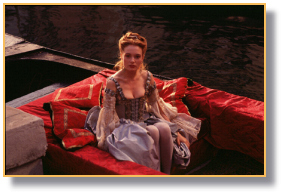![[safe]](safe.gif)

Dangerous Beauty

Starring: Catherine MacCormack, Rufus Sewell, Jacqueline Bisset,
Fred Ward, Oliver Platt, Moira Kelly, Jeroen Krabbe
Directed by: Marshall Herschkowitz
![[safe]](safe.gif)


Sumptuously shot in golden hues, "thirtysomething" creator Marshall Herschkowitz's new film is - well, what is it exactly? If one is uncharitable, it could well be dismissed as a full-length film version of a tawdry historical romance novel, replete with heaving bosoms and swashbuckling feats of dare-devilry. Luckily for Herschkowitz, his film manages to rise above its plot limitations and inexplicably becomes something more than a run-of-the-mill bodice-ripper.
Veronica Franco (the breathtakingly beautiful MacCormack, most notably the ill-fated Mrs Braveheart) is an intelligent and spritely beauty smitten with love for the aristocratic Marco Vernier (Rufus Sewell). Thwarted by society's rules regarding class and marriage, Veronica follows in her mother Paola's (Jacqueline Bisset) footsteps and becomes a courtesan, thereby gaining her entry to libraries of knowledge, king's courts and bedchambers of the richest, most powerful men of 15th century Venice. Rising to become the toast of all society for her beauty,  wit and warmth, Veronica nonetheless continues to pine for Marco, who weak-willed and somewhat spineless, only proves his worth when she becomes the victim of a witch-hunt instigated by a rival (who, surprise!, is not a woman).
wit and warmth, Veronica nonetheless continues to pine for Marco, who weak-willed and somewhat spineless, only proves his worth when she becomes the victim of a witch-hunt instigated by a rival (who, surprise!, is not a woman).
Based on a true story (pruportedly), the film benefits greatly from the sexual politics of current times; drawing parallels from Franco's life as the most accomplished woman of her time, who just happens to be a prostitute, and the current struggles in the women's movement will doubtlessly provide fodder for months of discussions amongst those so inclined. For those less inclined to pursue these strands of thought, the film offers a wonderful performance by MacCormack, who never delivers a false note throughout the demanding task of aging her character into maturity, and strong supporting work from Bisset, the reliable Krabbe, and (surprisingly) Ward. The film's score is extremely syruppy and is quite a disservice to the film's attempt to be taken more seriously (one wonders what the original score must have sounded like, this being the second one tacked on by director Herschkowitz), and the casting of Sewell as the object of Franco's all-consuming passion is bizarre - nothing in his demeanour and performance hints to the audience why someone so accomplished as Franco would desire a sap like him. Oliver Platt also hams it up viciously as the baddie; unfortunately, his character's motivations are oblique and his change from friend to foe attests to abrupt and clumsy scriptwriting.
Overall, "Dangerous Beauty" is worth a look. One pities the film-makers at having to sell a film so ill-defined that it is almost destined to be misunderstood to the extent that its target audience wouldn't be seen anywhere near it, and those it is not intended for may well flock to it.